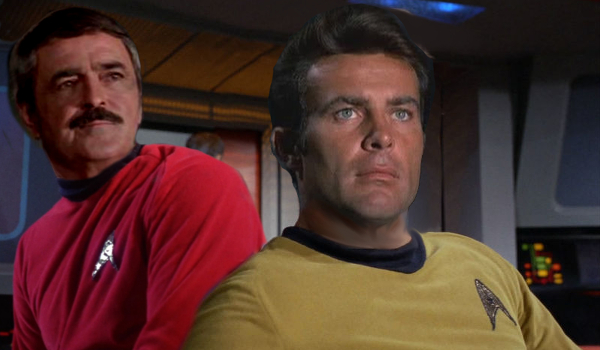It’s been fifty years since Star Trek began its spectacular eleven-season run on NBC. In its heyday, it was one of the most-watched shows on television, and the final episode in 1977 had the highest ratings of any TV show except for the 1974 Beverly Hillbillies finale. Star Trek spawned two spin-off series and a movie, but since the 1970s, Star Trek’s popularity has waned, and it does not get the attention it deserves. Let’s look back at this science fiction icon.
The show, created by Gene Roddenberry, revolved around the adventures of the crew of the starship Enterprise, patrolling the frontiers of the United Federation of Planets, which was basically like far-flung Space America. The Enterprise was a cross between a military ship and an exploratory vessel, and its mission was both to explore the fringes of known space, and check on remote outposts.
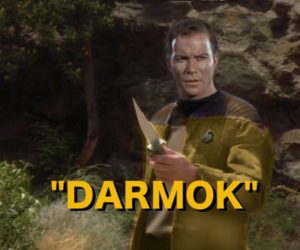
At first the focus of the show was the captain and his decisions, but Leonard Nimoy’s Spock, the half-human, half-alien first officer was the real break-out character of the show. Spock’s popularity was one of the reasons for the success of the show, but it was also one of the sources of tension behind the scenes, particularly with William Shatner, who thought the captain should really be the star of the show. Initially the captain was played by future Brady Bunch star Jeffrey Hunter as Captain Pike, but he was soon replaced by Canadian character actor William Shatner as Captain James Kirk, who left after a contract dispute at the end of season six. Wild Wild West star Robert Conrad stepped in as Captain Robert Baker for seasons seven and eight. Leonard Nimoy’s Spock commanded the Enterprise for much of season nine, until a somewhat chastened William Shatner returned as Captain Kirk for the rest of the series run.
Other characters included Deforest Kelley as the ship’s doctor, McCoy; James Doohan as Scotty, the engineer who was eventually promoted to first officer; singer Nichelle Nichols as Lt. Uhura, future Los Angeles mayor George Takei as the helmsman, Sulu, and Walter Koenig as Chekov, the ship’s navigator.
Star Trek was notable not just for the quality of its cast, but for the quality and variety of its storytelling, ranging from light comedy episodes featuring recurring characters like smuggler Harry Mudd (Roger C. Carmel) and capricious alien child-god Q (Paul Lynde), to hard science fiction like “Doomsday Machine” and “But A Walking Shadow,” to dramas like the heartbreaking “City on the Edge of Forever,” “Forever and a Day,” and the show’s magnum opus, “The Wrath of Khan.”
“Wrath of Khan” was the last and arguably the best episode of the series. It brought back Ricardo Montalban’s Khan, a memorable villain from the first season, and Robert Conrad’s Captain Baker, now commanding an advanced prototype of a powerful new starship, the U.S.S. Reliant, which was developed at a secret base on the edge of the Mutara Nebula. On a shakedown cruise, the Reliant encounters Khan, who captures the ship. When Starfleet loses contact with the Reliant, the Enterprise is ordered to investigate. Khan and the Reliant launch a surprise attack on the Enterprise, Baker sacrifices himself in an attempt to blow up the Reliant, and the crippled Enterprise must keep Khan from capturing the terraforming device at the Mutara research facility. Khan is defeated, but not before activating the device, and Spock is fatally wounded while repairing the Enterprise engines, which allows the ship to escape just before the terraforming device detonates and destroys the nebula. Kirk and Spock’s teary-eyed farewell was one of the best moments on television.
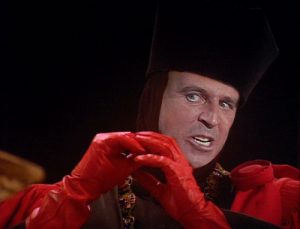
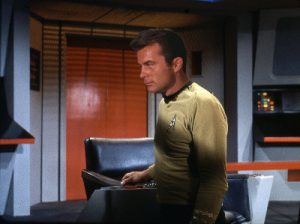
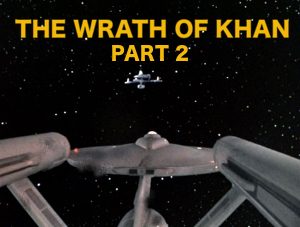
The Disastrous Movie
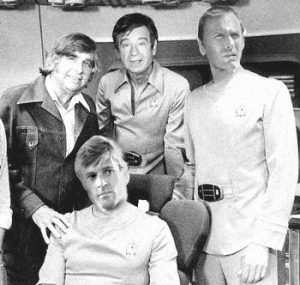
The series finale episode, “The Wrath of Khan” aired on May 18, 1977, just a week before Star Wars premiered. The timing couldn’t have been worse. The surprise success of Star Wars dismayed Paramount, which had just ended its signature science fiction franchise, thinking the public’s desire for science fiction TV and movies was played out. Gene Roddenberry suggested making a Star Trek theatrical film to Paramount executive Barry Diller. In a frantic effort to get SOMETHING into the theaters to cash in on the Star Wars craze, Diller agreed. The studio had grown weary of the wrangling with the TV show cast over the last decade, and Diller had the idea that a theatrical movie should have actual movie stars. Roddenberry resisted this idea, but he was essentially pushed out as the project snowballed in complexity and expense.
Robert Redford agreed to play Captain Kirk, if he could also direct, Clint Eastwood was signed to play Spock, and Walter Matthau played McCoy. It was a disaster. Roddenberry’s original story outline followed up on “The Wrath of Khan,” and involved bringing Spock back through a combination of time travel shenanigans with the Guardian of Forever, and Vulcan mystical claptrap. The studio rejected this idea, with the decision to reject the final continuity of the series and recast the characters. The final plot was a basically an expensive remake of the second season episode “The Changeling,” about a confused space probe, mushed together with the seventh season episode “But A Walking Shadow,” about a confused robot, all done by a cast of actors that hated each other.
The interaction of the ensemble cast was one of the attractions of the original TV show, and the movie stars larded into the ponderous cinematic production lacked this camaraderie. Redford seemed embarrassed by the whole thing, and Eastwood portrayed Spock as sort of a grumpy asshole. Affably gruff Walter Matthau was terrific as McCoy, but he couldn’t save the thing. Costing an astonishing (for the time) $50 million, the ruinous production nearly destroyed the career of pretty much everyone involved, except for Walter Matthau. Robert Redford never directed another film. Honestly, they should have just made a movie of “The Wrath of Khan.”
A Return to TV
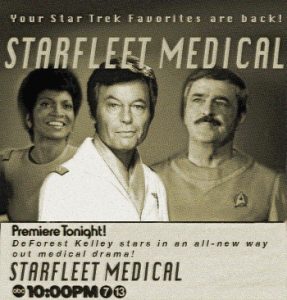
Following the colossal failure of the movie, Star Trek returned to the small screen, sort of, in the medical drama “Starfleet Medical.” DeForest Kelley returned as Dr. McCoy, who was now running a Starfleet hospital on remote Starbase Six, which was cobbled together from leftover sets, props, and the terrible pastel costumes from the doomed movie. Nichelle Nichols and James Doohan were also in it for some reason. Robert Reed also returned as the officious Commander Talbot, reprising the role he had played as a guest star in two episodes in season ten of the original Star Trek, and upholding the fine Star Trek tradition of every base commander being kind of a jerk.
Overall, Star Trek was a ground-breaking series that deserves a place in the pantheon of quality television. Paramount should remaster it and release all eleven seasons on Blu-ray.
